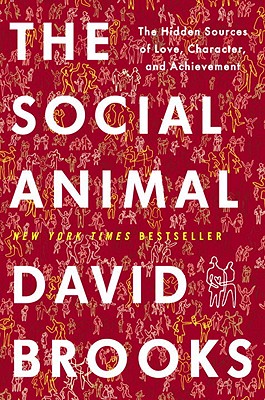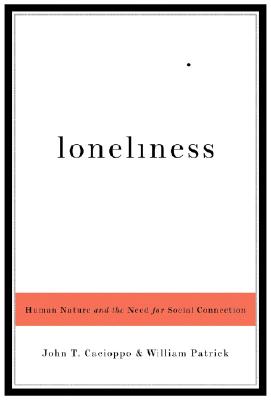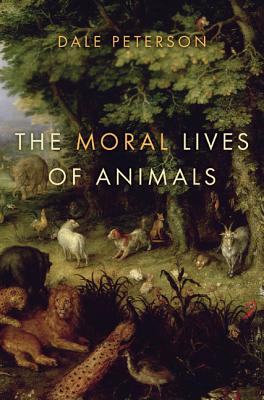Typically I find comfort in the bookstore, the atmosphere, the other book-minded patrons, the shelves upon shelves of conversation and information authors and publishers want to share with you. Each book is a unique little gift from those collective powers, talent, effort and time. But some days there is even more comfort than others. Days where I run into books like these:
Loneliness is compelling, interesting, and not the least bit depressing! In fact, I was becoming emotional toward the end, which isn't an average response to science writing, but it's because the true aspect of our tendencies lean toward cooperation and affection. This is a fascinating read, study after study in various venues, methods, and even looking at animals, all with a focus on loneliness:
John T. Cacioppo's groundbreaking research topples one of the pillars of modern medicine and psychology: the focus on the individual as the unit of inquiry. By employing brain scans, monitoring blood pressure, and analyzing immune function, he demonstrates the overpowering influence of social context-a factor so strong that it can alter DNA replication. He defines an unrecognized syndrome-chronic loneliness-brings it out of the shadow of its cousin depression, and shows how this subjective sense of social isolation uniquely disrupts our perceptions, behavior, and physiology, becoming a trap that not only reinforces isolation but can also lead to early death. He gives the lie to the Hobbesian view of human nature as a "war of all against all," and he shows how social cooperation is, in fact, humanity's defining characteristic. Most important, he shows how we can break the trap of isolation for our benefit both as individuals and as a society.
I was surprised to see this title on our Bargain table, Hardcover for less than $8! Considering the number of times my paperback copy has been handed out amongst my friends I really thought about buying two of these Bargain Hardcover editions but looked at the ever-growing stack of books in my hand and thought the better of it. Just seeing the cover again, though so clean and simple, brought back the flood of feelings and real affinity I have for humanity as a whole. And then as I continued to peruse I came across two other books that carried this redemptive theme:
 Brooks illustrates a fundamental new understanding of human nature. A scientific revolution has occurred—we have learned more about the human brain in the last thirty years than we had in the previous three thousand. The unconscious mind, it turns out, is most of the mind—not a dark, vestigial place but a creative and enchanted one, where most of the brain’s work gets done. This is the realm of emotions, intuitions, biases, longings, genetic predispositions, personality traits, and social norms: the realm where character is formed and where our most important life decisions are made. The natural habitat of The Social Animal. He reveals the deeply social aspect of our very minds and exposes the bias in modern culture that overemphasizes rationalism, individualism, and IQ. Along the way, he demolishes conventional definitions of success while looking toward a culture based on trust and humility. The Social Animal is a moving and nuanced intellectual adventure, a story of achievement and a defense of progress. Impossible to put down, it is an essential book for our time, one that will have broad social impact and will change the way we see ourselves and the world.
Brooks illustrates a fundamental new understanding of human nature. A scientific revolution has occurred—we have learned more about the human brain in the last thirty years than we had in the previous three thousand. The unconscious mind, it turns out, is most of the mind—not a dark, vestigial place but a creative and enchanted one, where most of the brain’s work gets done. This is the realm of emotions, intuitions, biases, longings, genetic predispositions, personality traits, and social norms: the realm where character is formed and where our most important life decisions are made. The natural habitat of The Social Animal. He reveals the deeply social aspect of our very minds and exposes the bias in modern culture that overemphasizes rationalism, individualism, and IQ. Along the way, he demolishes conventional definitions of success while looking toward a culture based on trust and humility. The Social Animal is a moving and nuanced intellectual adventure, a story of achievement and a defense of progress. Impossible to put down, it is an essential book for our time, one that will have broad social impact and will change the way we see ourselves and the world.And perhaps this last title won't seem as pertinent to some but I am as much disposed to my relationships and considerations of animals and plants as I am of those I have with and for people. And as far as displays of compassion and examples of love go, I'll take 'em anywhere I find 'em:
Wild elephants walking along a trail stop and spontaneously try to protect and assist a weak and dying fellow elephant. Laboratory rats, finding other rats caged nearby in distressing circumstances, proceed to rescue them. A chimpanzee in a zoo loses his own life trying to save an unrelated infant who has fallen into a watery moat.
The examples above and many others, argues Dale Peterson, show that our fellow creatures have powerful impulses toward cooperation, generosity, and fairness.
This rigorous and stimulating book challenges that notion, and it shows the profound connections-the moral continuum-that link humans to many other species. Peterson shows how much animal behavior follows principles embodied in humanity's ancient moral codes, from the Ten Commandments to the New Testament. Understanding the moral lives of animals offers new insight into our own.
The last two titles are on our New in Hardcover Table. It is always nice to find little reminders that tenderness and love are the default action, and that people are illuminating these truths to uplift those who happen upon them. I will end this celebration of human understanding with some quotes I also recently found that speak to all these hopes and insights:
"Three things in human life are important: the first is to be kind; the second is to be kind; and the third is to be kind." -Henry James
"If we have no peace, it is because we have forgotten that we belong to each other." -Mother Teresa
"A purpose of human life, no matter who is controlling it, is to love whoever is around to be loved." -Kurt Vonnegut
"I'm a human being first and foremost, and as such I'm for whoever and whatever benefits humanity as a whole." -Malcolm X
"it's love that enables him to feel another's pain as if it were his own...we are one another's lesson, one another's duty...replace[] metaphysics with human relationships"- Zadie Smith
Be well!



No comments:
Post a Comment